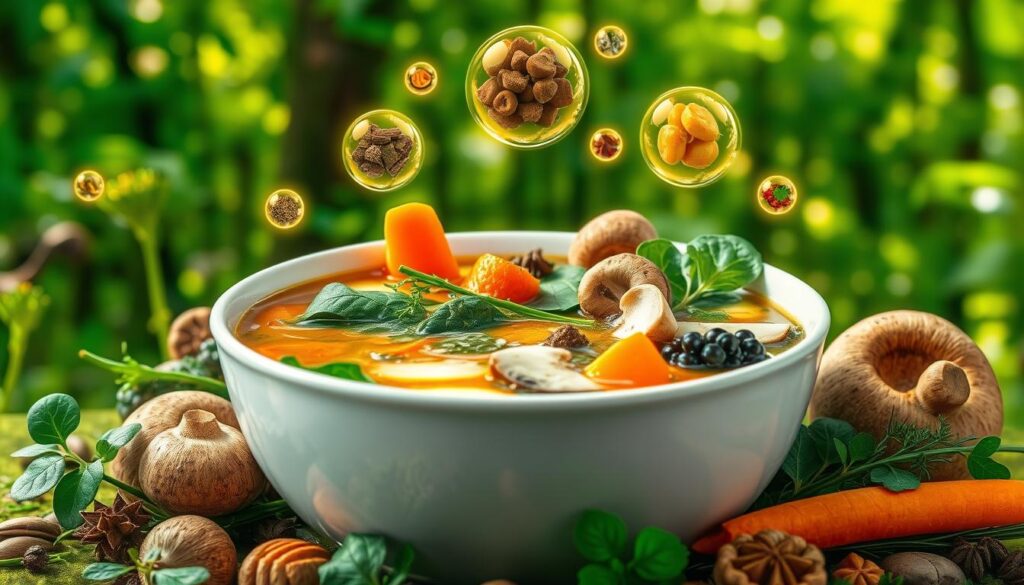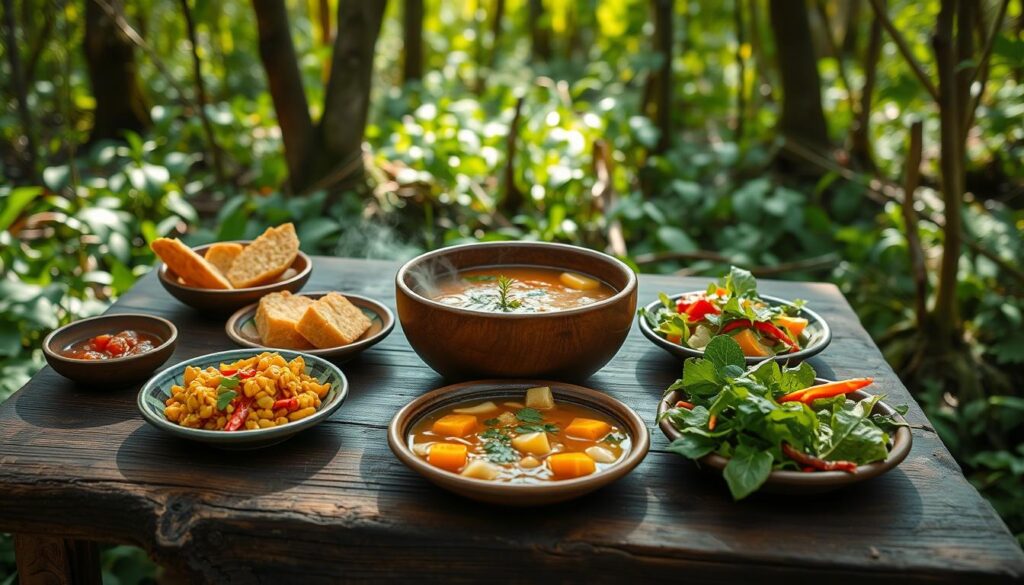Ever wondered about a soup that captures the soul of southern cooking with every spoonful? Swamp soup is a culinary treasure from Cajun cuisine. It blends hearty ingredients into a comforting meal that warms both body and spirit.
This swamp soup recipe is more than just a dish—it’s a journey through Southern flavors. It’s filled with smoked sausage, seasoned greens, and a mix of beans. It’s a celebration of resourcefulness and flavor that turns simple ingredients into an extraordinary dining experience.
From the bayous of Louisiana to kitchens across America, this soup has become a viral sensation. It captures the hearts of home cooks who crave authentic, soul-satisfying meals. Whether you’re a seasoned chef or a curious home cook, this swamp soup recipe promises to transport you to the heart of Southern cooking.
Table of Contents
Introduction to Swamp Soup’s Southern Heritage
Explore the world of Cajun cuisine with Swamp Soup. It’s more than a meal; it’s a story of tradition, creativity, and pride. It’s deeply rooted in the bayou flavors of the South.
Origins in Cajun Cuisine
Swamp Soup’s story starts in Louisiana’s lush bayous. Home cooks turned simple ingredients into amazing meals. It shows the power of Southern cooking traditions.
- Originated in Southern Alabama regions
- Reflects local ingredient availability
- Celebrates community and cultural diversity
From Bayou to Modern Kitchen
Swamp Soup has grown from a family recipe to a favorite dish. It now fits modern tastes. Different regions add their own twist, using ingredients like:
| Region | Unique Ingredients |
|---|---|
| Mississippi | Smoked beef sausage |
| Louisiana | Cayenne, crawfish |
TikTok Viral Sensation Story
TikTok has made Swamp Soup famous, sharing it with more people. Creative home cooks show their own versions, making it a hit.
“Swamp Soup isn’t just food—it’s a culinary journey through Southern traditions.” – Local Chef
Swamp Soup’s rich flavors and easy recipe have won fans everywhere. It shows that amazing food can bring people together, no matter where they are.
Essential Ingredients for Authentic Swamp Soup
To make a real swamp soup, you need the right ingredients. These ingredients bring the true taste of Southern cooking to your table. Let’s explore what makes this dish so special.
Premium Meat Selections
The main ingredient in swamp soup is the protein. Andouille sausage is the top choice, adding a smoky and spicy taste. Use high-quality Conecuh sausage, cut into small pieces and browned well.
- Andouille sausage (3 packages, sliced)
- Conecuh sausage (alternative option)
- Optional: Bacon for variation
Fresh and Canned Vegetables
Vegetables add depth and nutrition to swamp soup. Mixing fresh and canned ingredients gives a rich flavor.
| Vegetable Type | Quantity |
|---|---|
| Canned Turnip Greens | 2 cans |
| Rotel Tomatoes | 1 can (hot or mild) |
| Kidney Beans | 2 cans (drained) |
| Northern Beans | 2 cans (drained) |
| Okra | Fresh or frozen |
Seasonings and Spices Guide
The secret of swamp soup is in its seasoning. A mix of Cajun spices turns simple ingredients into a memorable dish. Filé powder adds a touch of Louisiana to your meal.
“Spices are the soul of Southern cooking” – Southern Culinary Wisdom
- Vegetable bouillon cubes (2)
- Chicken broth (1 quart)
- Texas Pete hot sauce
- Filé powder
- Cajun seasoning blend
Pro tip: Let your swamp soup simmer for 30-45 minutes. This lets the flavors mix, making a rich and satisfying meal that’s true to Southern cuisine.
Kitchen Equipment and Preparation Tips
Making the perfect swamp soup is more than just mixing ingredients. It’s about using the right kitchen tools. Start your cooking journey by picking the best cookware. This will turn simple ingredients into a meal you’ll remember.
Professional chefs say you need certain kitchen tools for a real swamp soup experience:
- A large gumbo pot (minimum 8-quart capacity)
- Sharp chef’s knife
- Sturdy cutting board
- Dutch oven for initial ingredient preparation
- Wooden spoon for stirring
Your dutch oven is key for browning sausage and sautéing veggies. Pro tip: Use the sausage drippings to cook vegetables, infusing deep, rich flavors into your soup base.
“The right equipment can transform a good soup into an extraordinary culinary experience.” – Southern Cooking Tradition
Today, home cooks also have slow cookers. They make cooking easy and keep the temperature steady. These gadgets let you quickly prep ingredients and then simmer the soup to perfection.
| Cooking Tool | Recommended Use | Cooking Time |
|---|---|---|
| Gumbo Pot | Full soup preparation | 25-30 minutes |
| Dutch Oven | Sautéing and initial cooking | 10-15 minutes |
| Slow Cooker | Low and slow cooking | 4-6 hours |
The secret to a great swamp soup is not just the ingredients. It’s also about the technique and tools you use. Pick your equipment carefully, and you’ll make a dish that tells a story of Southern cooking tradition.
Step-by-Step Swamp Soup Recipe
Making a real swamp soup takes time and the right steps. This Louisiana dish mixes rich tastes through careful making and old cooking ways.
Preparing the Base
Begin by making the roux, a key part for deep flavor. In a big Dutch oven, cook 16 oz of andouille sausage cut into coins. It’s important to get a good caramelization to boost your soup’s taste.
- Slice sausage into thin coins
- Brown meat until edges are crispy
- Remove sausage, keeping drippings in pan
Adding Vegetables and Proteins
Then, cook your veggies in the sausage drippings. Cut one yellow onion and add it to the pan with 2 tablespoons of unsalted butter. This method brings out amazing flavors that are true to swamp cuisine.
| Ingredient | Quantity |
|---|---|
| Canned Collard Greens | 2 x 27 oz cans |
| Corn Kernels | 1 x 15 oz can |
| Pinto Beans | 1 x 15 oz can |
| Chicken Broth | 4 cups |
Final Seasoning Adjustments
For a Southern twist, add fresh or frozen crawfish. Sprinkle 1/2 tablespoon of Cajun seasoning and let it simmer for 45 minutes. This lets all the flavors mix well.
“A great swamp soup is all about layering flavors and letting them dance together!” – Louisiana Home Cook
Your swamp soup is now ready to enjoy. It’s full of nutrients and Southern charm.
Customizing Your Swamp Soup
Every great recipe lets you get creative, and swamp soup is no different. You can make it your own with simple changes. These tweaks can turn the classic dish into a meal that’s uniquely yours.
Adding vegetarian options is easy. Swap out the smoked sausage for plant-based choices or add more veggies. Here are some protein-packed swaps:
- Smoked tofu cubes
- Tempeh chunks
- Seitan strips
- Roasted portobello mushrooms
Changing the spice level can also change the soup’s taste. Here’s how to do it:
- Use mild Rotel tomatoes for less heat
- Gradually increase Cajun seasoning
- Add hot sauce on the side
- Experiment with different pepper varieties
Check out more ways to customize your swamp soup with this guide:
| Customization Category | Suggested Variations |
|---|---|
| Greens | Collard greens, kale, spinach, Swiss chard |
| Grains | Rice, quinoa, ditalini pasta |
| Flavor Enhancers | Vinegar splash, fresh herbs, cheese garnish |
Pro tip: Always taste and adjust seasonings gradually to achieve your perfect balance.
“Cooking is about passion, creativity, and making each recipe your own.” – Anonymous Chef
Nutritional Benefits and Health Value
Swamp Soup is more than just a tasty comfort food. It’s a nutritional powerhouse that supports your health. This hearty meal is packed with proteins, vitamins, and minerals. It’s perfect for those looking for a nutritious meal.

Protein and Fiber Content
This soup is great for your body. It has about 13 grams of protein per serving. This helps keep your muscles strong and repairs them.
It also has around 10.5 grams of fiber per serving. Fiber is good for your digestive health and keeps you full longer.
- Protein supports muscle health
- High fiber promotes digestive wellness
- Helps maintain steady energy levels
Vitamin and Mineral Profile
Swamp Soup is not just about proteins and fibers. It’s also rich in vitamins and minerals. These nutrients are important for your daily health.
| Nutrient | Amount per Serving | Health Benefit |
|---|---|---|
| Vitamin A | 15% Daily Value | Supports eye health |
| Vitamin C | 22% Daily Value | Boosts immune system |
| Calcium | 8% Daily Value | Strengthens bones |
| Iron | 12% Daily Value | Supports blood health |
“Food is not just sustenance, it’s medicine for the body” – Anonymous Nutritionist
Adding Swamp Soup to your diet is a smart choice. It’s not only delicious but also packed with nutrients. Its balanced mix makes it a great choice for a healthy, filling meal.
Storage and Reheating Guidelines
Swamp soup is a great meal prep solution. It’s versatile for storage and reheating. It’s perfect for busy weekdays.
Refrigerator Storage
Proper storage keeps your soup fresh. Here’s how to do it right:
- Store in airtight containers
- Refrigerate within 2 hours of cooking
- Keep for 2-3 days in the refrigerator
Freezing Techniques
Swamp soup freezes well for meal prep. Here are some tips:
- Use freezer-safe containers or heavy-duty freezer bags
- Leave 1-inch space at the top for expansion
- Freeze for up to 4-6 months
Reheating Instructions
Ready to enjoy your soup? Here’s how to reheat it:
- Thaw overnight in the refrigerator
- Reheat on stovetop for best texture
- Add extra broth if soup appears too thick
- Heat until internal temperature reaches 165°F
Pro Storage Tips
Expert tips for keeping your soup fresh:
| Storage Method | Duration | Best Practices |
|---|---|---|
| Refrigerator | 2-3 days | Use glass containers with tight lids |
| Freezer | 4-6 months | Label with date and contents |
“Proper storage transforms good soup into great meal prep!” – Southern Cooking Experts
Follow these tips for delicious, safe soup. Enjoy it whenever you’re hungry.
Perfect Pairings and Serving Suggestions
Make your swamp soup special with classic Southern sides. These dishes turn a simple meal into a feast. The right sides bring out the soup’s rich flavors, making your meal unforgettable.
Traditional Southern Side Dishes
Southern cuisine pairs well with swamp soup. Here are some great options:
- Crispy hush puppies with a golden-brown exterior
- Warm, buttery cornbread muffins
- Steamed white rice
- Crusty French bread for dipping
Bread Companions
Bread is key to a great swamp soup meal. Try cornbread or cheddar jalapeno cornbread muffins. They add texture and flavor.
| Side Dish | Flavor Profile | Recommended Pairing |
|---|---|---|
| Cornbread | Sweet, buttery | Spicy swamp soup |
| Hush Puppies | Crispy, savory | Hearty vegetable-based soup |
| Rice | Neutral, filling | Protein-rich swamp soup |
Pro tip: Serve your swamp soup over fluffy rice or with cooked ditalini pasta. These touches make your soup more filling.

“In the South, a meal isn’t complete without the perfect side dish.” – Southern Cooking Tradition
Seasonal Variations and Adaptations
Your favorite swamp soup changes with the seasons, offering new tastes from summer to winter. In winter, it becomes a warm, comforting meal.
For a summer twist, use light and fresh ingredients:
- Fresh seasonal vegetables like zucchini and yellow squash
- Lighter protein options such as shrimp or chicken
- Herb-infused broths with fresh basil and thyme
In winter, make it heartier with:
- Root vegetables like carrots and sweet potatoes
- Extra protein through Andouille sausage
- Increased spice levels for warmth
“A great soup adapts to the season, telling a story through its ingredients” – Southern Cooking Tradition
Swamp soup can change with the seasons by swapping ingredients. Try different proteins, veggies, and spices to keep it interesting all year.
| Season | Key Ingredients | Cooking Style |
|---|---|---|
| Summer | Fresh squash, light proteins | Lighter broth, quick cooking |
| Winter | Root vegetables, sausage | Thick broth, longer simmer |
Pro tip: Always keep your base recipe consistent while playing with seasonal ingredients to maintain the authentic swamp soup character.
Conclusion
Swamp soup is a key part of Southern cooking tradition. It connects home cooks with a rich culinary heritage. Your exploration of this comfort food shows more than just a recipe. It’s a celebration of flavors and cooking techniques passed down through generations.
Every bowl of swamp soup has a story. It comes from Cajun roots and has evolved in modern kitchens. You can mix and match ingredients to make it your own, fitting different tastes and seasons.
Swamp soup is perfect for a cozy dinner or a warm meal on a cold day. It’s packed with kale, veggies, and protein. This makes it both tasty and good for you, linking you to Southern cooking.
Try making your own swamp soup recipe. Your kitchen becomes a place for creativity. Here, old traditions meet new ideas, making a dish that’s both traditional and uniquely yours.

